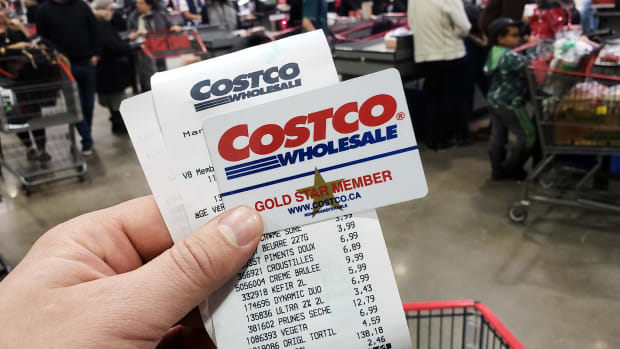Consumers have become very aware of prices. Market conditions, supply chain problems, and pandemic-related concerns have driven costs higher for stores. It costs more to get items onto shelves, and in most cases that means passing those costs onto customers.
Costco (COST) faces the same problems as any other retailer. The warehouse club, however, has built its business on offering low prices. That's its core offering. It sells memberships, and in exchange for joining, members get low prices.
Normally, Costco can offer that because it has an enormous amount of buying power. The chain can negotiate deals with vendors because it buys in huge quantities. That structure enables vendors to bring their costs down, which in turn enables them to sell to the warehouse club at lower prices. Costco then passes on those savings to customers.
Inflation -- higher prices mostly caused by pandemic-related supply-chain issues -- has not been something that Costco has been able to avoid. The company can still negotiate better deals than its rivals might get, but it has seen its costs go up for goods, shipping, and labor.
Passing those prices on to customers may not be as easy for Costco as it is for retailers that haven't built their business on low prices. That's something the chain has considered when it has decided which costs it can pass on to its members.

Shutterstock
Costco Has Raised Prices
Prices have gone up on pretty much every item at more or less every store. Costco has decided to not raise its membership prices (at least for now) due to the bigger economic concerns its customers face, but it has passed on some costs to them.
In the chain's third-quarter-earnings call, Senior Vice President Bob Nelson, filling in for vacationing Chief Financial Officer Richard Galanti, addressed how the warehouse club was handling higher costs.
"Well, look, I think we always want to be the best value in the marketplace," he said. "And to the extent that we continue to show that, I think it's easier for us to pass on higher pricing or higher freight costs or raw material costs, assuming that we show that value in the marketplace. And that's what it's all about really. And I think we feel good about it."
Nelson said that Costco monitors certain competitors and that the chain has passed on some price increases to customers.
"I mean our most recent shops, against who we watch most closely, have not changed. And we're every bit as competitive as we've been, notwithstanding the fact we have taken some prices up in certain areas, in food, in sundries, and in fresh foods," he added.
Here's What Costco Won't Do
Some retailers will test higher prices in a single store or market. Nelson made clear that Costco won't be doing that.
"We don't really test markets or we won't take a market like Seattle and test, taking our price up beyond our comfort level," he said.
"It all comes down to value proposition. And if we feel like we can take a price up and pass on some of the costs that we're incurring in our goods, and the value proposition is still there, we'll go there. We're not testing all these items across the space,"
Nelson also noted that Costco's buying practices help it manage costs and prices.
"I mean it is unprecedented times," he said. "I will tell you that because of our limited SKU counts and the small number of SKUs that each buyer actually manages, they have a pretty good understanding of where their competitive situation is in the marketplace, and they have a pretty good feel about what kind of business they can do at what price.
"And I think that helps us in terms of managing that."







